Sonata form - Study guides, Class notes & Summaries
Looking for the best study guides, study notes and summaries about Sonata form? On this page you'll find 309 study documents about Sonata form.
Page 3 out of 309 results
Sort by
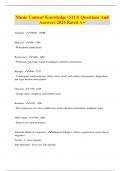
-
Music Content Knowledge (5113) Questions And Answers 2024 Rated A+
- Exam (elaborations) • 14 pages • 2024
-
- $9.99
- + learn more
Antiquity - 500AD - 500BC Medieval - 500 - 1400 - Monophonic (plain chant) Renaissance - - Polyphonic voice lines (motet & madrigal), added bass instruments Baroque - - Counterpoint, small orchestras, (flutes, oboes, horns, and violins), string quartets, harpsichord and organ become more popular Classical - - Strings, opera, symphony, and chamber music Romantic - - More expressive, free-form, middle class music education, nationalism, symphonic poem 20th Century - - Rejection o...
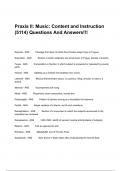
-
Praxis II: Music: Content and Instruction (5114) Questions And Answers!!!
- Exam (elaborations) • 37 pages • 2024
-
- $11.39
- + learn more
Episode - ANS Passage that does not state the principal subject (esp in Fugue) Exposition - ANS Section in which subject(s) are announced. In Fugue, Sonata, Concerto. Fugue - ANS Composition or Section in which subject is answered or repeated by several parts. Hocket - ANS Splitting up a melodic line between two voices Leitmotif - ANS Musical theme/motive assoc. w a person, thing, emotion or idea in a drama Monody - ANS Accompa...
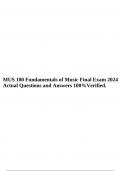
-
MUS 100 Fundamentals of Music Final Exam 2024 Actual Questions and Answers 100%Verified.
- Exam (elaborations) • 15 pages • 2024
- Available in package deal
-
- $12.99
- + learn more
MUS 100 Fundamentals of Music Final Exam 2024 Actual Questions and Answers 100%Verified. Review Test Submission: Week Four Final Exam Content Cours e MUS100 Fundamentals of Music Test Week Four Final Exam Attempt Score 100 out of 100 points Question 1 3 out of 3 points Which composer is not considered to be representative of the Classical period? Selected Answer: Hector Berlioz Correct Answer: Hector Berlioz Question 2 3 out of 3 points Identify the composer, title or d...
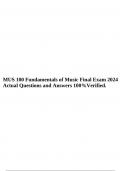
-
MUS 100 Fundamentals of Music Final Exam 2024 Actual Questions and Answers 100%Verified.
- Exam (elaborations) • 15 pages • 2024
- Available in package deal
-
- $12.99
- + learn more
MUS 100 Fundamentals of Music Final Exam 2024 Actual Questions and Answers 100%Verified. Review Test Submission: Week Four Final Exam Content Cours e MUS100 Fundamentals of Music Test Week Four Final Exam Attempt Score 100 out of 100 points Question 1 3 out of 3 points Which composer is not considered to be representative of the Classical period? Selected Answer: Hector Berlioz Correct Answer: Hector Berlioz Question 2 3 out of 3 points Identify the composer, title or d...
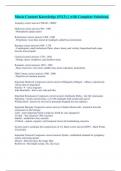
-
Music Content Knowledge (5113) || with Complete Solutions.
- Exam (elaborations) • 7 pages • 2024
- Available in package deal
-
- $10.29
- + learn more
Antiquity correct answers 500AD - 500BC Medieval correct answers 500 - 1400 - Monophonic (plain chant) Renaissance correct answers - Polyphonic voice lines (motet & madrigal), added bass instruments Baroque correct answers - Counterpoint, small orchestras (flutes, oboes, horns, and violins), harpsichord and organ become more popular Classical correct answers - Strings, opera, symphony, and chamber music Romantic correct answers - More expressive, free-form, middle class m...
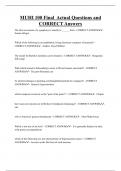
-
MUHI 100 Final Actual Questions and CORRECT Answers
- Exam (elaborations) • 8 pages • 2024
-
- $9.49
- + learn more
MUHI 100 Final Actual Questions and CORRECT Answers The first movement of a symphony is usually in ______ form - CORRECT ANSWER- Sonata Allegro Which of the following is an established, living American composer of musicals? - CORRECT ANSWER- Andrew Lloyd Webber The model for Bartok's melodies can be found in - CORRECT ANSWER- Hungarian folk songs
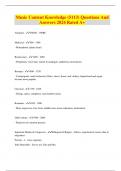
-
Music Content Knowledge (5113) Questions And Answers 2024 Rated A+
- Exam (elaborations) • 10 pages • 2024
-
- $8.99
- + learn more
Antiquity - 500AD - 500BC Medieval - 500 - 1400 - Monophonic (plain chant) Renaissance - - Polyphonic voice lines (motet & madrigal), added bass instruments Baroque - - Counterpoint, small orchestras (flutes, oboes, horns, and violins), harpsichord and organ become more popular Classical - - Strings, opera, symphony, and chamber music Romantic - - More expressive, free-form, middle class music education, nationalism 20th Century - - Rejection of common practice Important Medie...
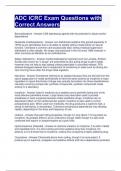
-
ADC ICRC Exam Questions with Correct Answers
- Exam (elaborations) • 22 pages • 2024
-
- $13.79
- + learn more
ADC ICRC Exam Questions with Correct Answers Benzodiazepine - Answer-CNS depressing agents with the potential for abuse and/or dependence Quaalude (methaqualone) - Answer-non-barbiturate sedative that gained popularity in 1970s as an aphrodisiac due to its ability to sedate without impairments on sexual function. Overdose is common and occasionally fatal. without medical supervision withdrawal is often deadly. No longer manufactured in the US since 1983 however in other countries as Mandrax...
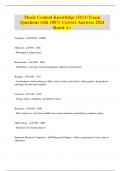
-
Music Content Knowledge (5113) Exam Questions with 100% Correct Answers 2024 Rated A+
- Exam (elaborations) • 14 pages • 2024
-
- $10.49
- + learn more
Antiquity - 500AD - 500BC Medieval - 500 - 1400 - Monophonic (plain chant) Renaissance - - Polyphonic voice lines (motet & madrigal), added bass instruments Baroque - - Counterpoint, small orchestras, (flutes, oboes, horns, and violins), string quartets, harpsichord and organ become more popular Classical - - Strings, opera, symphony, and chamber music Romantic - - More expressive, free-form, middle class music education, nationalism, symphonic poem 20th Century - - Rejection o...
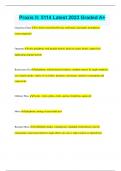
-
Praxis II: 5114 Latest 2023 Graded A+
- Exam (elaborations) • 19 pages • 2023
- Available in package deal
-
- $9.99
- + learn more
Praxis II: 5114 Latest 2023 Graded A+ Gregorian Chant no distinct meter/freeflowing, melismatic and largely monophonic (unaccompanied) Organum early polyphony with parallel motion, based on cantus firmus, improvised duplicating original melody Renaissance Era polyphony, refined musical notation, complete masses by single composer, use of greek modes, clarity of vocal lines, harmonic consonance, imitative counterpoint and expressivity Ordinary Mass 6 parts - kyrie, gloria, credo, sanctus, bene...

How did he do that? By selling his study resources on Stuvia. Try it yourself! Discover all about earning on Stuvia


